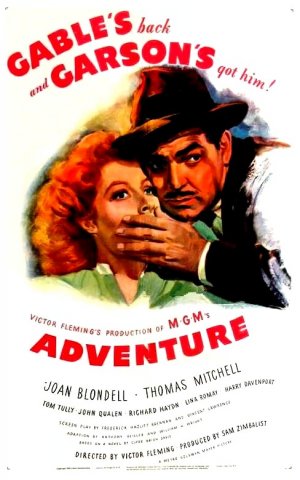Gable’s Back ! And Garson’s Got Him ! What A Battling Sizzling Love Team !
Everybody figured when Clark Gable returned from serving in World War Two that he’d pick up his movie career right where he left off. His first foray back onto the screen was 1945’s Adventure, featuring a mini-male reunion of 1939’s Gone with the Wind with Victor Fleming, Harry Davenport and Thomas Mitchell all coming together in addition to Gable himself. Adventure is definitely a Victor Fleming picture and his direction makes it surely a bit better than it otherwise might deserve. Fleming’s only misstep is perhaps an overuse of rear projection, much of which hasn’t aged well, but that’s a minor detail.
Unfortunately Adventure fails to excite, though technically it’s a well produced picture. Perhaps the weakest part is the plot. It features the underdeveloped story of a merchant marine captain (Gable) who has a woman in every port finally meeting his true love (Greer Garson) in the library while trying to find a way for one of his crew members (Thomas Mitchell) to regain his soul. But before linking up with Garson, Gable briefly also dates her roommate (Joan Blondell).
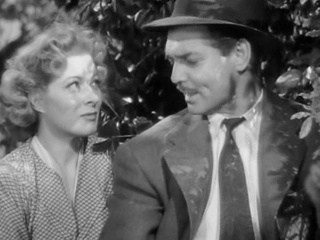 Gable and Garson galavant around a farm, stealing a few chickens for dinner and other tepid fare before running off to Reno for a quick wedding. On realizing that Gable’s unrequited love of the sea and his other girls means that Garson will only see her new husband once or twice a year, she requests a divorce. Only after returning to the sea and getting Mudgin (Thomas Mitchell) his soul back does Gable realized that Garson is something special and returns to her for a revealing reunion in the finale.
Gable and Garson galavant around a farm, stealing a few chickens for dinner and other tepid fare before running off to Reno for a quick wedding. On realizing that Gable’s unrequited love of the sea and his other girls means that Garson will only see her new husband once or twice a year, she requests a divorce. Only after returning to the sea and getting Mudgin (Thomas Mitchell) his soul back does Gable realized that Garson is something special and returns to her for a revealing reunion in the finale.
It takes a little over two hours to cover this ground and Adventure would have been better served with a tighter run time. In spite of Fleming’s excellent direction and composition (including one shot of Garson and Gable’s first kiss which is lit and framed almost identically to a similar shot in GWTW), the cast simply can’t carry this light load that long with much integrity. For a movie titled Adventure there is surprisingly little…. er, well…..adventure.
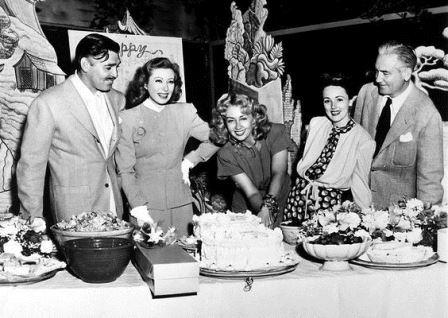 Greer Garson is a curious choice as Gable’s love interest here. This is their only onscreen pairing and they simply don’t click. Not even appearing for the first twenty minutes or so, her character seems a poor fit for Gable: a bookish and quiet librarian paired with a carousing sea captain. Perhaps there’s a hidden message there, but if so it’s never really developed. The character also flip flops quite a bit with the more extroverted moments feeling forced and artificial. She’s a dour librarian one minute and in the next she’s bashing a plate over Gable’s head in a brawl. Her flip from blissful newlywed to eager divorcee to jilted lover running down the wharf is also confusing. A better option might have been to give Blondell the Garson role and eliminate Blondell’s original role altogether.
Greer Garson is a curious choice as Gable’s love interest here. This is their only onscreen pairing and they simply don’t click. Not even appearing for the first twenty minutes or so, her character seems a poor fit for Gable: a bookish and quiet librarian paired with a carousing sea captain. Perhaps there’s a hidden message there, but if so it’s never really developed. The character also flip flops quite a bit with the more extroverted moments feeling forced and artificial. She’s a dour librarian one minute and in the next she’s bashing a plate over Gable’s head in a brawl. Her flip from blissful newlywed to eager divorcee to jilted lover running down the wharf is also confusing. A better option might have been to give Blondell the Garson role and eliminate Blondell’s original role altogether.
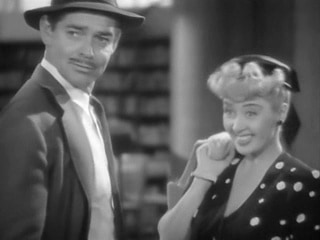 Joan Blondell’s no longer quite as bubbly as she is in her numerous early 1930’s roles with Warners but she’s got more than enough for what’s required in this, a clearly MGM production. There’s an energy and life to her performance and once can see her being easily a much better fit for Gable- now she’s someone you can see him falling for and giving up his life on the sea for. Sadly her efforts are mostly wasted in a throwaway role which is completely unneeded in the story line.
Joan Blondell’s no longer quite as bubbly as she is in her numerous early 1930’s roles with Warners but she’s got more than enough for what’s required in this, a clearly MGM production. There’s an energy and life to her performance and once can see her being easily a much better fit for Gable- now she’s someone you can see him falling for and giving up his life on the sea for. Sadly her efforts are mostly wasted in a throwaway role which is completely unneeded in the story line.
Gable looks like he didn’t miss a beat and it’s another strong performance for him, especially in the scene where he and Mudgin (Thomas Mitchell) head into the library. Here Gable mocks most of the philosophical platitudes etched into the library, continuing as they peruse a book in the library as well, perilously shouting down the other readers. He seems to realize as well that he isn’t clicking with Garson, though he gives it his all.
Gable picks up without losing a beat from his prewar films, carousing, having some good brawls, and also laughing along catching chickens with Garson. Though Adventure is usually cited as confirmation of Gable’s end as the King of Hollywood, it’s hard to fault him here given what (and who) he had to work with.
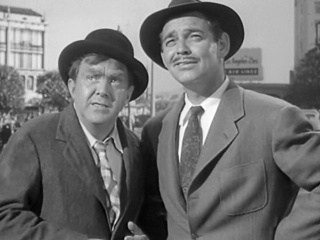 Thomas Mitchell as Mudgin also presents us with some challenges. For once, Mitchell is given a bit more to do than in most of his roles as here he can be a ‘philosophical’ drunk as opposed to just a normal one. He’s one of the characters we might want to hear a bit more of, especially his backstory. He is likely the voice of reason in the picture- and Gable’s conscience- though this too isn’t really well developed or even addressed.
Thomas Mitchell as Mudgin also presents us with some challenges. For once, Mitchell is given a bit more to do than in most of his roles as here he can be a ‘philosophical’ drunk as opposed to just a normal one. He’s one of the characters we might want to hear a bit more of, especially his backstory. He is likely the voice of reason in the picture- and Gable’s conscience- though this too isn’t really well developed or even addressed.
Though Adventure was profitable on release it was considered a bit of a flop. The performances are all outstanding, notwithstanding the lack of chemistry between Gable and Garson. If there is a critical weakness to the picture, it’s definitely the poorly developed plot, which tends to have a bit more fluff perhaps than needed and muddies the water unconscionably with Greer Garson’s seemingly constant changes of heart (and direction).
